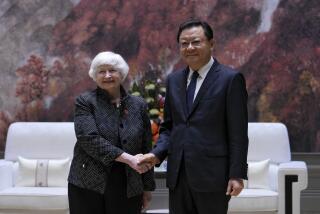U.S. to welcome Chinese official Xi Jinping amid high tensions
U.S. and Chinese officials have spent three years carefully planning how to introduce the man likely to be the next Chinese leader to an American audience.
But with China coming in for sharp criticism as the U.S. presidential campaign got into full swing, some Chinese officials briefly wondered whether they should postpone Xi Jinping’s goodwill tour.
Xi’s five-day visit, which begins Tuesday when he meets President Obama, is an essential step in the world’s most important power relationship. Xi needs to show officials back home that the Americans will treat him with respect; the White House wants to gauge Xi’s style before it has to deal with him as the Chinese leader.
Xi, 58, who has been China’s vice president since 2008, is expected to replace Hu Jintao as Communist Party leader this year, and next year as president, a post he would be expected to hold for a decade.
Current and former U.S. officials say the two countries began planning for a series of high-level visits three years ago. Aware that China has often been a political target during American political campaigns, Chinese officials considered pulling the plug on Xi’s trip, but ultimately decided to go ahead.
Xi arrives as the two governments are grappling with issues including trade ties, a potential military rivalry in East Asia and diplomacy on Iran, Syria and North Korea.
“There are going to be some challenges and some difficulties, firstly with the economic issues,” said Jeffrey Bader, who was the top East Asia official at the National Security Council for the first two years of the Obama administration.
Obama needs to get U.S. concerns across to Xi without backing him into a corner, analysts said.
“If the Obama team wants to turn Xi into a more mistrustful counterpart and corner him into taking tough stances when he is actually in authority … pressing him now will be just the right formula,” Douglas Paal, a longtime U.S. government advisor on Asia, wrote last week.
In the last decade, China became the world’s second-largest economy and its foreign currency reserves have mushroomed, making it in effect the biggest foreign banker to America’s huge national debt.
White House officials say Obama will seek better access to Chinese markets. Xi is likely to seek an explanation of Obama’s decision to refocus U.S. diplomatic and military policy on the Asia Pacific region, including plans to deploy U.S. troops in Australia and other areas.
Xi also will meet with Vice President Joe Biden, Secretary of State Hillary Rodham Clinton, congressional leaders and Pentagon brass. He will travel to Iowa to revisit farms he saw on a trip in 1985 and visit Los Angeles on his way back to China.
Briefing reporters in Beijing last week, Chinese Vice Foreign Minister Cui Tiankai spoke of a “trust deficit” with the United States. American officials don’t disagree.
Major U.S. corporations have sued China for alleged intellectual property theft, and U.S. business leaders in China complain about measures that favor Chinese companies.
“The U.S. business community is as unhappy as I’ve seen it in 30 years,” said David M. Lampton, director of China studies at Johns Hopkins University’s School of Advanced International Studies.
Both sides accuse the other of engaging in cyber attacks
U.S. officials hope it will be easier to build a relationship with Xi, who is said to be outgoing and fond of Western ways, than with his predecessor. Xi’s daughter is a student at Harvard University, and he speaks warmly of his visit to the Midwest as a provincial official.
“He projects an image of someone more cosmopolitan than Hu,” said Jeffrey Wasserstrom, a Chinese history professor at UC Irvine.
But Xi has given no sign that he intends to open China’s political system or end human rights abuses. He has complained about what he calls U.S. meddling in Chinese affairs, and taken a hard line against autonomy for Tibet.
Analysts say Xi may prove to be more deft than Hu in dealing with concerns of businesses. He has held leadership roles in Shanghai and neighboring Zhejiang province, two centers of business and foreign investment.
“Xi is probably coming into office with a better understanding than Hu had of China’s dependence on global trade and the nature of the international economic system,” said Nicholas Lardy, a China expert at the Peterson Institute for International Economics.
Beijing has begun to address Washington’s perennial complaint about China’s currency, which has appreciated about 30% against the dollar since 2005. That has helped reduce China’s foreign trade surplus by more than two-thirds since the end of 2007.
But economic tensions remain high, especially in an election year. After the White House said in November that it would investigate Chinese solar panel exporters for illegal subsidies, Beijing slapped tariffs on some large cars imported from the U.S.
In America, Xi mostly intends to show a friendly face.
On Wednesday, after giving a speech and meeting lawmakers, he will fly to Iowa and talk about boosting agricultural trade, one area in which the U.S. enjoys a trade surplus.
In Los Angeles on Friday, he will talk to business leaders who trade with China, visit a classroom where children are learning Chinese, and reportedly take in a Lakers game. He’ll be accompanied by Biden and will meet Mayor Antonio Villaraigosa and California Gov. Jerry Brown.
More to Read
Start your day right
Sign up for Essential California for news, features and recommendations from the L.A. Times and beyond in your inbox six days a week.
You may occasionally receive promotional content from the Los Angeles Times.








